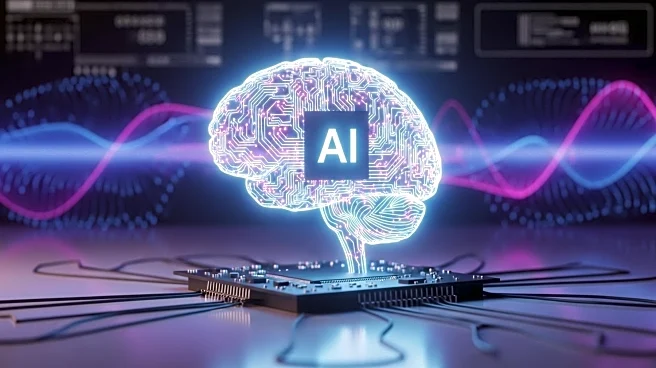What is the story about?
What's Happening?
OpenAI has reached a valuation of $500 billion following a major share sale, marking a significant milestone in the ongoing AI boom. This valuation leap highlights the growing investor enthusiasm for artificial intelligence technologies. Microsoft and Meta are emphasizing an 'AI platform shift,' with Microsoft CEO Satya Nadella describing it as a 'tectonic' change. Microsoft is realigning its operations around AI, reflecting the industry's broader move towards integrating AI into various sectors. Qualcomm is also advancing its AI capabilities by adopting ARM's new v9 architecture for its flagship chips, aiming to enhance on-device AI performance. Meanwhile, Samsung and SK Hynix have agreed to supply memory chips for OpenAI's 'Stargate' AI server project, further underscoring the demand for AI infrastructure.
Why It's Important?
The surge in OpenAI's valuation and the strategic shifts by major tech companies like Microsoft and Qualcomm indicate a transformative period for the AI industry. This boom is expected to drive significant advancements across various sectors, including technology, business, and finance. Companies that successfully integrate AI into their operations stand to gain competitive advantages, while those that lag may face challenges. The increased demand for AI infrastructure, such as memory chips, highlights the economic opportunities for hardware suppliers. However, the rapid pace of AI development also raises concerns about cybersecurity, as AI tools are increasingly used by attackers to craft sophisticated phishing and malware.
What's Next?
As the AI industry continues to evolve, companies are likely to increase their investments in AI research and development. Microsoft and Qualcomm's moves suggest that more tech firms will focus on enhancing AI capabilities in their products and services. The demand for AI infrastructure is expected to grow, benefiting hardware suppliers like Samsung and SK Hynix. However, the industry must also address cybersecurity challenges, as AI tools are being weaponized by attackers. Companies will need to upgrade their security measures to protect against these threats.
Beyond the Headlines
The AI boom is not only reshaping the technology landscape but also influencing broader economic and societal trends. The integration of AI into everyday products and services could lead to shifts in consumer behavior and expectations. Additionally, the ethical implications of AI, such as privacy concerns and the potential for job displacement, will require careful consideration by policymakers and industry leaders. As AI becomes more pervasive, the need for responsible and transparent AI development will become increasingly important.

















